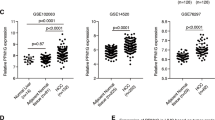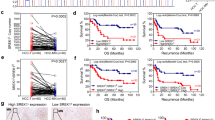Abstract
The pre-mRNA splicing regulator serine-arginine protein kinase 1 (SRPK1) promotes cancer development and various pathophysiological processes. However, the clinical relevance of SRPK1 in hepatocellular carcinoma (HCC) is not clear. This study investigates the expression and prognostic value of SRPK1 in HCC. We found that SRPK1 expression was significantly upregulated at the mRNA and protein level in all HCC cell lines or HCC tissue samples compared with the hepatic cell line or matched noncancerous tissue samples, respectively. Higher SRPK1 expression significantly correlated with clinical staging (p = 0.031), survival time (p = 0.004), and gender (p = 0.011) of HCC patients. Together, our study showed that SRPK1 is overexpressed in HCC and may be a promising indicator of prognosis for HCC patients.




Similar content being viewed by others
References
Scott T. Eblen: Regulation of chemoresistance via alternative messenger RNA splicing. Biochem Pharmacol. 2012;8:1063–72. doi:10.1016/j.bcp.2011.12.041.
Graveley BR. Sorting out the complexity of SR protein functions. RNA. 2000;9:1197–211.
Papoutsopoulou S, Nikolakaki E, Chalepakis G, Kruft V, Chevaillier P, Giannakouros T. SR protein-specific kinase 1 is highly expressed in testis and phosphorylates protamine 1. Nucleic Acids Res. 1999;27:2972–80.
Hayes GM, Carrigan PE, Miller LJ. Serine-arginine protein kinase 1 overexpression is associated with tumorigenic imbalance in mitogen-activated protein kinase pathways in breast, colonic, and pancreatic carcinomas. Cancer Res. 2007;5:2072–80.
Wu Q, Chang Y, Zhang L, Zhang Y, Tian T, Feng G, et al. SRPK1 dissimilarly impacts on the growth, metastasis, chemosensitivity and angiogenesis of glioma in normoxic and hypoxic conditions. J Cancer. 2013;9:727–35. doi:10.7150/jca.7576. eCollection 2013.
Plasencia C, Martínez-Balibrea E, Martinez-Cardús A, Quinn DI, Abad A, Neamati N. Expression analysis of genes involved in oxaliplatin response and development of oxaliplatin-resistant HT29 colon cancer cells. Int J Oncol. 2006;1:225–35.
Odunsi K, Mhawech-Fauceglia P, Andrews C, Beck A, Amuwo O, Lele S, et al. Elevated expression of the serine-arginine protein kinase 1 gene in ovarian cancer and its role in cisplatin cytotoxicity in vitro. PLoS One. 2012;7(12):e51030. doi:10.1371/journal.pone.0051030.
Nowak DG, Amin EM, Rennel ES, Hoareau-Aveilla C, Gammons M, Damodoran G, et al. Regulation of vascular endothelial growth factor (VEGF) splicing from pro-angiogenic to anti-angiogenic isoforms: a novel therapeutic strategy for angiogenesis. J Biol Chem. 2010;285(8):5532–40. doi:10.1074/jbc.M109.074930.
Gammons MVR, Dick AD, Harper SJ, Bates DO. SRPK1 inhibition modulates VEGF splicing to reduce pathological neovascularization in a rat model of retinopathy of prematurity. Invest Ophthalmol Vis Sci. 2013;54:5797–806. doi:10.1167/iovs.13-11634.
Parkin DM, Bray F, Ferlay J, Pisani P. Global cancer statistics. CA Cancer J Clin. 2002;2005(55):74–108.
Luca Faloppi B, Mario Scartozzi A, Elena Maccaroni B, Marzia Di Pietro Paolo C, Rossana Berardi A, Michela Del Prete A, Stefano C. Evolving strategies for the treatment of hepatocellular carcinoma: from clinical-guided to molecularly-taylored therapeutic options. Cancer Treat Rev 2011;(37):169–177.
Franceschi S, Raza SA. Epidemiology and prevention of hepatocellular carcinoma. Cancer Lett. 2009;286:5–8.
Mazzanti R, Gramantieri L, Bolondi L. Hepatocellular carcinoma: epidemiology and clinical aspects. Mol Aspects Med. 2008;29(1-2):130–43.
Lai EC, Fan ST, Lo CM, Chu KM, Liu CL, Wong J. Hepatic resection for hepatocellular carcinoma An audit of 343 patients. Ann Surg. 1995;221:291–8.
Ercolani G, Grazi GL, Ravaioli M, Del Gaudio M, Gardini A, Cescon M, et al. Liver resection for hepatocellular carcinoma on cirrhosis: univariate and multivariate analysis of risk factors for intrahepatic recurrence. Ann Surg. 2003;237:536–43.
Kinugasa H, Nouso K, Takeuchi Y, Yasunaka T, Onishi H, Nakamura S, et al. Risk factors for recurrence after transarterial chemoembolization for early-stage hepatocellular carcinoma. J Gastroenterol. 2012;47(4):421–6. doi:10.1007/s00535-011-0492-9.
Qiu J, Huang P, Liu Q, Hong J, Li B, Lu C, et al. Identification of MACC1 as a novel prognostic marker in hepatocellular carcinoma. J Transl Med. 2011;9:166. doi:10.1186/1479-5876-9-166.
Livak KJ, Schmittgen TD. Analysis of relative gene expression data using real-time quantitative PCR and the 2(-Delta Delta C (T)) method. Methods. 2001;25:402–8.
Baig S. Gender disparity in infections of Hepatitis B virus. S J Coll Physicians Surg Pak. 2009;19(9):598–600.
Pawlik TM, Delman KA, Vauthey J-N, Nagorney DM, Ng IO, Ikai I, et al. Tumor Size Predicts Vascular Invasion and Histologic Grade: Implications for Selection of Surgical Treatment for Hepatocellular Carcinoma. Liver Transpl. 2005;9:1086–92.
Hayes GM, Carrigan PE, Beck AM, Miller LJ. Targeting the RNA splicing machinery as a novel treatment strategy for pancreatic carcinoma. Cancer Res. 2006;7:3819–27.
Oltean S, Gammons M, Hulse R, Hamdollah-Zadeh M, Mavrou A, Donaldson L, et al. SRPK1 inhibition in vivo: modulation of VEGF splicing and potential treatment for multiple diseases. Biochem Soc Trans. 2012;40(4):831–5. doi:10.1042/BST20120051.
Amin EM, Oltean S, Hua J, Gammons MV, Hamdollah-Zadeh M, Welsh GI, et al. WT1 mutants reveal SRPK1 to be a downstream angiogenesis target by altering VEGF splicing. Cancer Cell. 2011;20(6):768–80. doi:10.1016/j.ccr.2011.10.016.
Bates DO, Cui TG, Doughty JM, Winkler M, Sugiono M, Shields JD, et al. VEGF165b, an inhibitory splice variant of vascular endothelial growth factor, is down-regulated in renal cell carcinoma. Cancer Res. 2002;14:4123–31.
Qiu Y, Hoareau-Aveilla C, Oltean S, Harper SJ, Bates DO. The anti-angiogenic isoforms of VEGF in health and disease. Biochem Soc Trans. 2009;37:1207–13. doi:10.1042/BST0371207.
Fukuhara T, Hosoya T, Shimizu S, Sumi K, Oshiro T, Yoshinaka Y, et al. Utilization of host SR protein kinases and RNA-splicing machinery during viral replication. Proc Natl Acad Sci U S A. 2006;30:11329–33.
Karakama Y, Sakamoto N, Itsui Y, Nakagawa M, Tasaka-Fujita M, Nishimura-Sakurai Y, et al. Inhibition of hepatitis C virus replication by a specific inhibitor of serine-arginine-rich protein kinase. Antimicrob Agents Chemother. 2010;8:3179–86. doi:10.1128/AAC.00113-10.
Acknowledgments
This work was supported by the Science and Technology Department of Guangzhou (No. 2014 J4100063), National Science Foundation of China (No. 81101317), and Science and Technology Planning Project of Guangdong Province, China (No. 2013B021800040)
Authors’ contributions
GS, JZ, HJ, and WFX devised the study. JZ, HJ, YZJ, XYT, and PYL selected participants, oversaw diagnostic evaluations, and directed YJ, XJ, and PYL studies and analyses. HYJ and XWY performed the statistical analyses. GS wrote the manuscript and all authors participated in reviewing and editing the manuscript.
Author information
Authors and Affiliations
Corresponding author
Additional information
Jing Zhang, Hua Jiang and Wenfei Xia contributed equally to this work.
Rights and permissions
About this article
Cite this article
Zhang, J., Jiang, H., Xia, W. et al. Serine-arginine protein kinase 1 is associated with hepatocellular carcinoma progression and poor patient survival. Tumor Biol. 37, 283–290 (2016). https://doi.org/10.1007/s13277-015-3771-x
Received:
Accepted:
Published:
Issue Date:
DOI: https://doi.org/10.1007/s13277-015-3771-x




